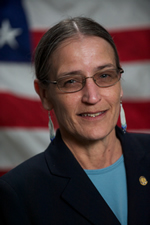The Gaye L. Tenoso Indian Country Fellowship
 The Gaye L. Tenoso Indian Country Fellowship
The Gaye L. Tenoso Indian Country Fellowship
The Gaye L. Tenoso Indian Country Fellowship, part of the Attorney General's Honors Program, is designed to create a new pipeline of legal talent with expertise and deep experience in federal Indian law, tribal law, and Indian country issues that can be deployed in creative ways to build tribal capacity, combat violent crime, and bolster public safety in Indian country jurisdictions.
The Fellowship is named in honor of the late Gaye L. Tenoso, a Department of Justice attorney whose distinguished service to the Department and the people it serves spanned 30 years. For the last six years of her life Gaye served as the Deputy Director the Office of Tribal Justice. Gaye’s expertise in Federal Indian law and knowledge of tribes enabled her to be an exceptionally effective advisor on litigation and policy matters. She worked tirelessly to ensure that specific protections for Native American women were included in the Violence Against Women Act Reauthorization of 2013. Gaye also mentored many legal interns during her time at the Office of Tribal Justice, and was an inspiration and guide who left a deep impression on many young attorneys.
Prior to serving with the Office of Tribal Justice, Gaye worked for over 25 years in the Department of Justice Civil Rights Division in the Educational Opportunities Section and the Voting Section. While in the Voting Section, she received the high honor of being invited by the United States Solicitor General to sit at counsel table during the Supreme Court argument in Reno v. Bossier Parish School District. In addition, Gaye led the Civil Rights Division’s Election Monitoring Program to ensure the right to vote for all Americans. Gaye’s passion was to ensure American Indians were provided the same access to voting as others. She was instrumental in bringing cases against counties in Arizona, New Mexico, and Utah to provide language assistance at the polls for American Indians, where she helped spearhead unprecedented remedies to provide voting opportunities for all.
Fellowship Details
Each Tenoso Indian Country Fellowship position offers a 36-month appointment that may be extended or converted to a permanent position at the hiring component’s discretion without further competition. Candidates will interview with a joint panel of attorneys from the Executive Office for U.S. Attorneys (EOUSA) and participating U.S. Attorneys' Offices (USAOs). Candidates who receive an offer of employment will be able to select their assignment preferences from the list of participating USAOs with significant Indian country work. Actual placement will be mutually agreed upon by the Fellow and the District. In addition, individual USAOs may offer additional Indian Country Fellowship positions at their discretion. This year, the Indian Country Fellowship will place one Fellow in a U.S. Attorney's Office (any participating District) with assignment based on mutual agreement of the Fellow and District.
As part of your work with a USAO, Indian Country Fellows will be required to serve 12 months with an appropriate tribal legal entity, typically in a tribal prosecutor’s office. The assignment or detail may consist of a one-year detail to a single tribal legal or governmental entity or two six-month details to different tribal legal or governmental entities.
The Indian Country Fellowship is open to all eligible Honors Program applicants, including current law students graduating in the coming academic year. The 2024-2025 Honors Program application opens on July 31, 2024, and closes on September 3, 2024. There are a few requirements associated with bar admission that applicants should consider:
Fellows who accept an offer from a USAO located in a jurisdiction that requires State bar admission must become admitted to that bar within 12 months of entry on duty.
Whether or not the USAO is located in a jurisdiction that requires admission to that State’s bar, all Indian Country Fellows hired by USAOs must be admitted to a bar (any U.S. jurisdiction) within 12 months of appointment.
Incoming Fellows who are not admitted to a bar (or who have not recently taken a bar with results pending) are expected to take the first available bar examination for which they are eligible (e.g., a May 2025 law school graduate should take the July 2025 bar exam unless eligible to take a spring 2025 bar exam.
Fellows must meet specific tribal court or bar admission requirements, if relevant to their assigned District.
Placement Opportunities for the 2024-2025 Indian Country Fellowship
District of Montana | District of Nebraska | District of New Mexico | District of North Dakota | Northern District of Oklahoma | Eastern District of Washington

